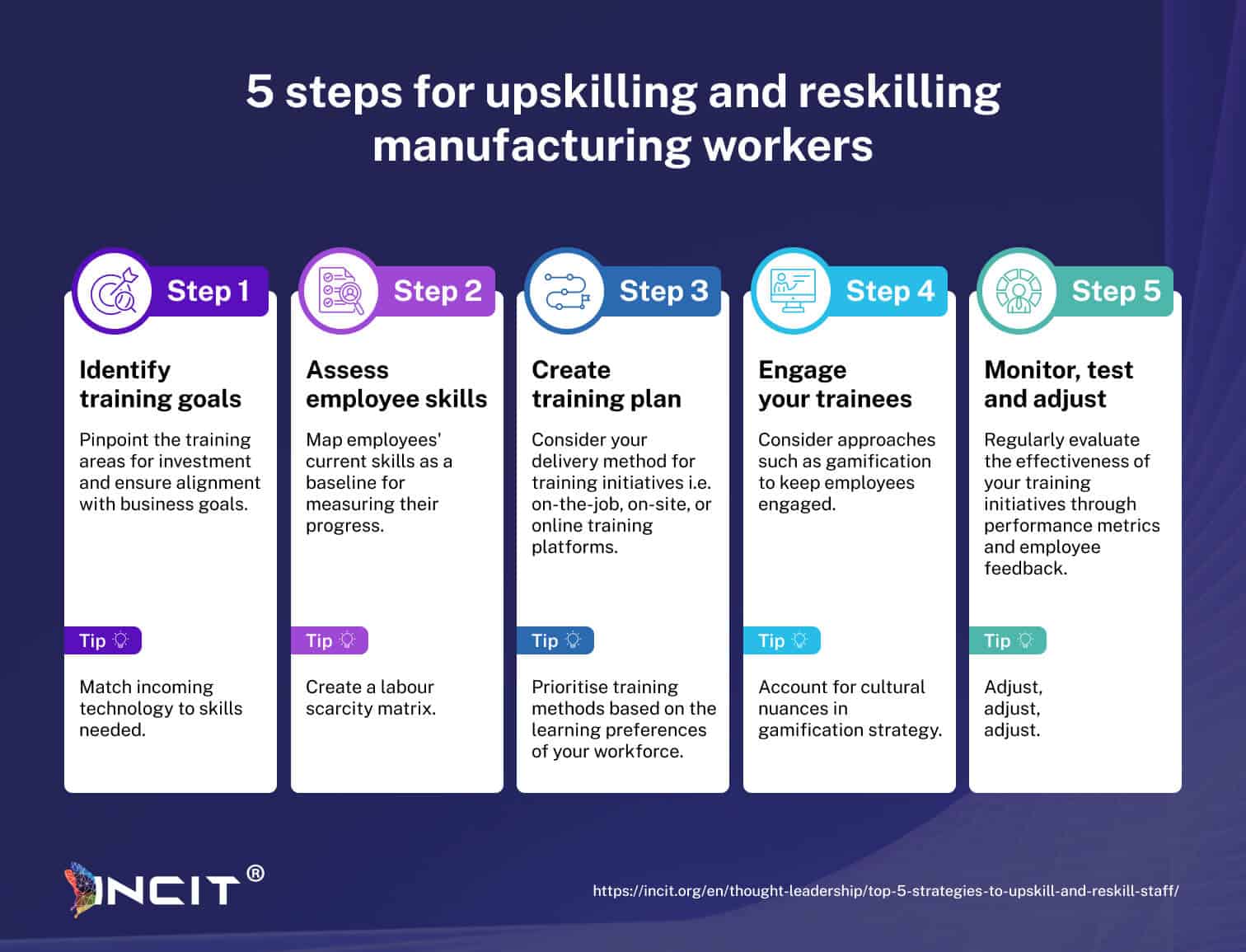그만큼 significant skill gap in manufacturing continues to widen, as underscored by Deloitte’s research, which found that 2.1 million unfilled jobs will result in a cost of roughly $1 trillion to the United States in 2030 현재와 미래의 인재 부족에는 다양한 이유가 있다는 것을 우리는 알고 있습니다. 그 이유는 주로 노동력 고령화, 기술 발전이 따라가지 못하는 역량, 그리고 제조업의 역할에 대한 시대에 뒤떨어진 관점 때문입니다. 묘사된 위험하고 매력적이지 않은 작업 조건을 연상시킵니다. 미국 소설가 업튼 싱클레어의 '정글'.
에 따르면 미국 상공회의소, 제조업 부문의 일자리 공석 중 45%는 채워지지 않은 상태입니다. 세계경제포럼의 2023년 일자리의 미래 report highlights that 40 of the current skill requirements in advanced manufacturing are expected to evolve over the next five years. Leaders have sounded the alarm, according to a survey by the 전국 제조업자 협회(NAM)제조 관리자의 약 75%가 숙련 노동력 부족을 주요 비즈니스 과제로 꼽았습니다.
Manufacturers are grappling with a significant labour shortage that demands urgent attention, but what can businesses do to prepare for the looming talent crisis? Below, we explore the key steps to put for empowering workers through targeted upskilling programs, ensuring resilience and growth in the face of workforce challenges.

전략적 기술 향상 이니셔티브를 통해 미래에 대비한 인력 육성
Labour shortages in the manufacturing sector are now endemic and expected to worsen. It is imperative for manufacturing companies to invest in upskilling and reskilling initiatives. By implementing targeted training programs aligned with evolving job roles and leveraging innovative methods like gamification (use it to make the reskilling more engaging!), manufacturers can empower their workforce to adapt, thereby alleviating labour shortfalls in the business. Embracing these strategies will not only bridge the skills gap but also position manufacturing firms for sustained growth and competitiveness in the global market.
또한, 다음과 같은 전문 교육 프로그램 시리/코시리 프로그램 offered by 선동하다, can support leaders with their ongoing skill development with this certification, which advances digitalisation and sustainability practices within manufacturing. Embracing these strategies will not only bridge the skills gap but also position manufacturing firms for sustained growth and competitiveness in the global market.
Frequently Asked Questions About Upskilling and Reskilling in Manufacturing
What Are the 4 Strategies for Upskilling and Reskilling?
The four key strategies for upskilling and reskilling in manufacturing are:
- On-the-job training
- Digital learning platforms
- Industry-academic partnerships
- Certification programs
These approaches help workers gain new skills for smart manufacturing and Industry 4.0.
Why is Upskilling Important in Manufacturing?
Upskilling is important in manufacturing because it helps workers adapt to new technologies, improve productivity, and stay competitive in a rapidly changing Industry 4.0 environment.
What is the Difference Between Upskilling and Reskilling in Manufacturing?
Upskilling means learning new skills to grow in a current role, while reskilling involves training workers for entirely new roles. Both are essential in manufacturing to support digital transformation and automation.
How Can Manufacturers Create a Future-ready Workforce?
Manufacturers can create a future-ready workforce by investing in continuous training, embracing digital tools, building learning cultures, and aligning workforce development with Industry 4.0 technologies.
What Challenges Do Manufacturers Face in Workforce Training?
Manufacturers face challenges like limited training budgets, lack of digital literacy, ageing workforces, and difficulty keeping pace with fast-changing technologies in smart manufacturing.
What Are Examples of Upskilling in Smart Manufacturing?
Examples of upskilling in smart manufacturing include training workers to use robotics, data analytics tools, digital twins, IoT platforms, and AI-based production systems.
How Does Industry 4.0 Affect Workforce Planning?
Industry 4.0 affects workforce planning by shifting the demand toward tech-savvy roles, requiring new skills, and pushing manufacturers to rethink training, hiring, and talent retention strategies.
What Are the Best Practices for Workforce Transformation in Manufacturing?
Best practices for workforce transformation include skills gap assessments, personalised learning paths, leadership development, partnerships with tech providers, and performance tracking tied to Industry 4.0 goals.



